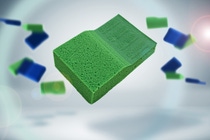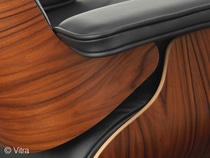Media
BASF at UTECH 2024: Ready for the circular economy with sustainable recycling solutions for polyurethanes
- Sustainability meets comfort: BASF develops recyclable PU flexible foam
- Vitra uses recyclable foam in first furniture pieces
- Chemical recycling of PU rigid foam systems from old refrigerators
BASF is presenting new concepts and recycling methods for polyurethanes at UTECH in Maastricht. The leading international trade fair and conference for the global polyurethane industry will take place from April 23-25 in Maastricht, NL. Circular economy is one of the major topics in all PU sectors. BASF offers new, sustainable material developments and recycling methods for various industries, which will be presented at the BASF stand, E20.
Designed for recycling: New mechanically recyclable PU flexible foam
BASF presents a new generation of flexible PU foams suitable for thermoplastic recycling at the end of their life cycle. These new meltable PU foams combine the advantages of recyclability with the comfort properties of conventional PU foams. The foams can be 100% recycled and used as a raw material for new foams. This is made possible by a recycling process developed by BASF, in which the old foam is transformed into a new polyol in an energy-efficient process. "With the development of our 'designed-for-recycling'-foam, we have a new type of product that makes it possible to use polyurethane waste as a raw material for new foams," says Dr. Lukas Wilm, R&D PU Flexible Foams, BASF Polyurethanes. After its first service life, the foam can be returned to the material cycle and used for new products in various application areas such as the automotive, footwear and furniture industries.
PU meets design: Vitra uses recyclable PU in first furniture pieces
Sustainability is at the centre of activities of Swiss furniture manufacturer Vitra. This is why its products are designed to be particularly durable and recyclable at the end of their lifespan. "We strive for a closed material cycle for our product lines. With the new PU foams, we can finally produce recyclable upholstery for our office chairs, armchairs and sofas," explains Harald Gerwig, Global Head of Technics, Vitra.
Next exit circular economy: ZF Lifetec develops recyclable steering wheel
Recyclable PU foam also offers enormous potential in the automotive industry. On average, up to 25 kg of PU can be found in a car. Whether in seats, doors, instrument panels or steering wheels. ZF Lifetec is taking this even further and, together with BASF, has developed a first steering wheel prototype that contains ZF Lifetec production waste. "Our innovative PU enables waste-free production and a reduction in CO2 emissions," says Dr Mark Staniford, Marketing Transportation, BASF Polyurethanes. "It is important for our customers in the automotive industry to receive circular economy solutions from us, which we can now offer with the new PU."
The refrigerator of the future is recyclable
BASF introduces new circular economy concepts to enable the recycling of insulation materials in refrigerators. The use of the PU insulation material Balindur® in vacuum insulation panels(VIP) in combination with Elastocool®F reduces the number of materials to just one and offers first-class insulation for refrigerators. By avoiding inorganic VIP core materials, the recycling process of used refrigerators can be significantly simplified. To return polyurethane to the same material cycle, BASF has opted for a chemical recycling process developed jointly with its partners KraussMaffei, Rampf and Remondis. In a continuous industrial depolymerisation process, high-quality recycled polyols are produced, which in turn can be used for new PU rigid foams.
"We are developing an efficient process that makes it possible to reduce the use of fossil raw materials for the insulation of refrigerators," explains Dr Martin Baumert, Head of Technical Development Insulation Solutions, BASF Polyurethanes.
Ultrasim® celebrates 25 years as pioneer in material simulation
Powered by unique and ultra-fast simulation methods, extensive material data, and easy-to-access web services, BASF’s computer-aided engineering (CAE) competence Ultrasim® creates an unparalleled offering in the competitive landscape. As a pioneer in the field, BASF introduced the first integrative simulation capability for plastics in 1999, laying the foundation for what is today a strong global network. At UTECH, BASF showcases how its competence in polyurethane simulation enables customers to sustainably develop products that use molded foams, also with the help of two PU-specific Ultrasim® Web Services: The apps Foaming for 3D foaming simulation and VELA for predicting the EU energy label of a warm water tank.
Visit us at UTECH 2024, Stand E 20 in Maastricht
Our presentations at the UTECH Conference:
Dr Mark Staniford, Polyurethanes optimised for circularity; 23.4.2024, 5.30 pm, MECC
Dr Martin Baumert, Sustainable PU solutions for appliances; 24.4.2024, 11.15 am, MECC
About BASF
At BASF, we create chemistry for a sustainable future. We combine economic success with environmental protection and social responsibility. Around 112,000 employees in the BASF Group contribute to the success of our customers in nearly all sectors and almost every country in the world. Our portfolio comprises six segments: Chemicals, Materials, Industrial Solutions, Surface Technologies, Nutrition & Care and Agricultural Solutions. BASF generated sales of €68.9 billion in 2023. BASF shares are traded on the stock exchange in Frankfurt (BAS) and as American Depositary Receipts (BASFY) in the United States. Further information at www.basf.com.
About BASF’s Performance Materials division
BASF’s Performance Materials division is at the forefront of the much-needed sustainability transformation in plastics. Our products are co-created with customers around the globe to bring innovations to major industry sectors such as transportation, consumer goods, industrial applications, and construction. Our R&D focuses on all stages of the plastics journey: Make, Use and Recycle. The MAKE phase is about improving how plastics are made, from product design to the choice of raw materials and the manufacturing process itself. The USE phase enhances plastics’ strengths such as light weight, robustness, and thermal resistance. At the end of the product lifecycle, the RECYCLE phase looks at how to close the loop to achieve a circular economy. In 2023, the Performance Materials division achieved global sales of €7.2 billion. Join #ourplasticsjourney at: www.performance-materials.basf.com
About Vitra
The Swiss family-owned company Vitra was founded in 1950. Creating forward-looking products and concepts with excellent designers is the essence of Vitra. These products are developed in Switzerland and used worldwide by architects, companies and private individuals to create inspiring living spaces, working environments and public areas. Vitra's classics represent ground-breaking design of the twentieth century. Today, Vitra combines technical and conceptual know-how with the creativity of contemporary designers to push the boundaries of design possibilities.
While the first generation of Vitra's owner family laid the commercial foundations of the company and the second added the cultural dimension with the development of the Vitra Campus, the Vitra Design Museum, its design archives and its extensive furniture collection, the third generation is focusing on sustainable thinking and action. www.vitra.com.
P-24-169


